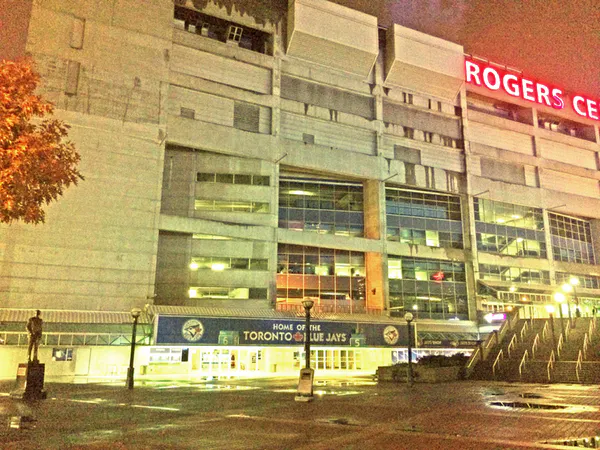Could Rogers Be Getting Set To Sell The Blue Jays? Like, Maybe For Real This Time?

Oct 25, 2017, 00:19 EDTUpdated: Oct 25, 2017, 00:32 EDT
Usually when a city starts to hear rumblings that a beloved sports franchise of theirs is up for sale trepidation sets in awfully quickly. Not so when it comes to the Toronto Blue Jays, who are now over a decade-and-a-half deep into being owned by Canadian telecommunications giant Rogers, and one of just two MLB clubs remaining that are coporately owned.
From getting a chance to properly auction off their broadcast rights, to not having every financial decision floated through the prism of an army of stockholders, there is a lot to like about the idea of the Jays no longer being controlled by a publicly traded company — and no chance that the club might move from what’s one of the great markets in the game. Even if the Jays were to be purchased by a jointly-owned venture like MLSE — of which Rogers and Bell own 37.5% each, with the remaining 25% belonging to Larry Tanenbaum’s Kilmer Sports Inc. — that would seem to be quite preferable to the current setup. As Dave “the Hammer” Shoalts wrote for the Globe and Mail in 2015, an accounting rule known as the “equity accounting method” means that ” the profit or loss of any majority-owned asset such as the Blue Jays has to be included in Rogers’ earnings before interest, taxes, depreciation and amortization (EBITDA), which can directly affect the company’s share price,” but that “publicly traded companies can combine the profits or losses of any subsidiary companies in which they own less than a 51-per-cent interest and keep those results separate from their annual EBITDA.”
In plain terms, to crib the examples Shoalts used then, MLSE can go and spend big on Mike Babcock, Lou Lamoriello, and a state-of-the-art practice facility for the Raptors without those big outlays of cash affecting Rogers’ or BCE’s bottom in in the same way that it would if the Jays were to ramp up their budget to sign a top tier free agent. “According to a source familiar with the finances of both Rogers and BCE,” Shoalts wrote, “if Rogers were to sign [David] Price for $30-million a season, then that $30-million would have to come from the budgets of other Rogers Media companies.”
Why do I bring this all up? Because new Rogers CEO Joe Natale has just passed the six month mark on the job, and apparently there are rumblings that the former Telus honcho — who from the beginning was thought to maybe not be enamored with his new company’s diverse array of divisions — might be getting set to move the company’s focus back to its core assets. Or so says a report this week from Andrew Willis of the Globe’s Report on Business ($).
After Rogers management sat down with analysts in New York last month, Citibank published a note that said Rogers brass is earmarking cash from asset sales for paying down debt, buying back shares and boosting dividends.Coming out of the same meeting, UBS pumped out a report detailing how Rogers’s management planned to deal with the taxes that would come with selling the Jays and Cogeco shares.
We’re later told that “speculation on Rogers’s plans for the Jays and the Cogeco stake has swirled for years. But the arrival of a new CEO with a reputation for a laser focus on wireless and cable operations and the steady drumbeat for asset sales from the analysts has got the hedge-fund crowd sniffing around.”
Most crucially, we’re told this:
The Rogers CEO is consistently demonstrating a deep knowledge of the case for selling some of the telecom company’s legacy holdings. If the Jays, MLSE and the Cogeco position are truly non-core assets, and it’s clear they are, look for Mr. Natale to move sooner rather than later by cashing in on one or more of these businesses.
This is all just speculation, then. But it’s… uh… pretty strong speculation, isn’t it? Especially that last bit. And though elsewhere in the piece, Natale is quoted as saying that the company is “happy with the asset mix we have right now,” the implication seems pretty clearly to be that that’s really the only thing he could say on the matter, whether it’s true or not.
I’m sure there are readers out there who are far better versed in the language of the business pages than I am, who might be able to parse this stuff a whole lot better than I can, and could maybe point out stuff that I’m missing. But to a layman like myself, this certainly feels — more than at any point that I can remember (which isn’t exactly saying much) — like a thing that could actually be inching toward actually happening. I guess we’ll see! And if it is…uh… yeah! Let’s do this!
(For more to think on the subject, consider Jon Shell’s piece from earlier this summer at BP Toronto, in which he makes the case that it’s time for Rogers to sell. Shit, maybe it really is!).
Crotch grab in the direction of the great @_ClintB for the heads up!
